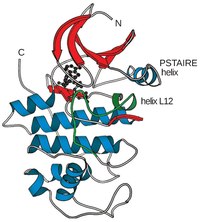
Photo from wikipedia
SummaryDeregulation of cap-dependent translation has been implicated in the malignant transformation of numerous human tissues. 4EGI-1, a novel small-molecule inhibitor of cap-dependent translation, disrupts formation of the eukaryotic initiation factor… Click to show full abstract
SummaryDeregulation of cap-dependent translation has been implicated in the malignant transformation of numerous human tissues. 4EGI-1, a novel small-molecule inhibitor of cap-dependent translation, disrupts formation of the eukaryotic initiation factor 4F (eIF4F) complex. The effects of 4EGI-1-mediated inhibition of translation initiation in malignant pleural mesothelioma (MPM) were examined. 4EGI-1 preferentially inhibited cell viability and induced apoptosis in MPM cells compared to normal mesothelial (LP9) cells. This effect was associated with hypophosphorylation of 4E–binding protein 1 (4E–BP1) and decreased protein levels of the cancer-related genes, c-myc and osteopontin. 4EGI-1 showed enhanced cytotoxicity in combination with pemetrexed or gemcitabine. Translatome-wide polysome microarray analysis revealed a large cohort of genes that were translationally regulated upon treatment with 4EGI-1. The 4EGI-1-regulated translatome was negatively correlated to a previously published translatome regulated by eIF4E overexpression in human mammary epithelial cells, which is in agreement with the notion that 4EGI-1 inhibits the eIF4F complex. These data indicate that inhibition of the eIF4F complex by 4EGI-1 or similar translation inhibitors could be a strategy for treating mesothelioma. Genome wide translational profiling identified a large cohort of promising target genes that should be further evaluated for their potential significance in the treatment of MPM.
Journal Title: Investigational New Drugs
Year Published: 2017
Link to full text (if available)
Share on Social Media: Sign Up to like & get
recommendations!